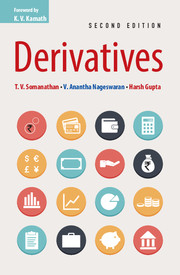Book contents
- Frontmatter
- Dedication
- Contents
- List of Tables, Figures and Boxes
- Foreword
- Preface to the First Edition
- Preface to the Second Edition
- Acknowledgements
- Part–I Introduction
- Part–II Forwards and Futures
- Part–III Swaps
- Part–IV Options
- Part–V Other Derivatives and Derivative-like Instruments
- 15 Other Derivatives
- 16 Exchange Traded Funds and Structured Products
- Part–VI Accounting, Taxation and Regulatory Framework
- Part–VII Portfolio Management and Management of Derivative Risks
- Bibliography
- Index
15 - Other Derivatives
from Part–V - Other Derivatives and Derivative-like Instruments
Published online by Cambridge University Press: 02 August 2019
- Frontmatter
- Dedication
- Contents
- List of Tables, Figures and Boxes
- Foreword
- Preface to the First Edition
- Preface to the Second Edition
- Acknowledgements
- Part–I Introduction
- Part–II Forwards and Futures
- Part–III Swaps
- Part–IV Options
- Part–V Other Derivatives and Derivative-like Instruments
- 15 Other Derivatives
- 16 Exchange Traded Funds and Structured Products
- Part–VI Accounting, Taxation and Regulatory Framework
- Part–VII Portfolio Management and Management of Derivative Risks
- Bibliography
- Index
Summary
The three main derivative securities (futures, swaps and options) have been discussed at length in preceding chapters. This chapter covers other derivatives, in brief. Analytically, many of these derivatives can also be viewed as being constructed from the basic building blocks of futures and options, an exception being event-based derivatives which are closer conceptually to insurance contracts.
Forward rate agreements
A forward rate agreement is a contract, generally entered into between a bank and a customer, which gives the latter a guaranteed future rate of interest to cover a specified sum of money over a specified period of time in the future. A forward rate agreement (FRA) does not involve actual lending or borrowing of sums of money. It is merely an agreement which fixes a rate of interest for a future transaction. At the time when the customer actually requires funds, he has to separately borrow the money in the cash market at the rate of interest prevailing then. If the rate of interest payable in the cash market turns out to be higher than the rate of interest fixed in the FRA (entered into earlier), the bank which signed the FRA will pay to the customer the difference in the interest rate. However, if the rate of interest payable in the cash market turns out to be lower than that fixed in the FRA, the customer has to pay the difference in the rate of interest. This transaction is known as purchase of a FRA from the bank.
It is worth repeating that no actual lending or borrowing is involved in the FRA. If the customer eventually decides not to borrow the sum of money, no amount is payable from or to the bank. While reference was made to a customer intending to borrow, it is also possible for a customer to enter into an FRA for his deposits. A customer may wish to have a guaranteed rate of interest for a sum of money which he intends to deposit at a future point of time. He can enter into an FRA with a bank. He has to separately make a deposit in the cash market at the appropriate point of time.
- Type
- Chapter
- Information
- Derivatives , pp. 235 - 240Publisher: Cambridge University PressPrint publication year: 2017



